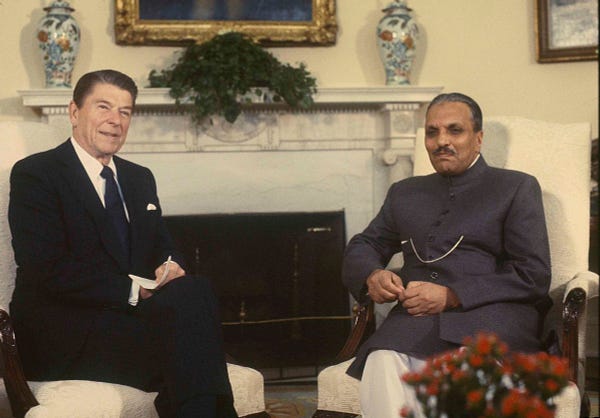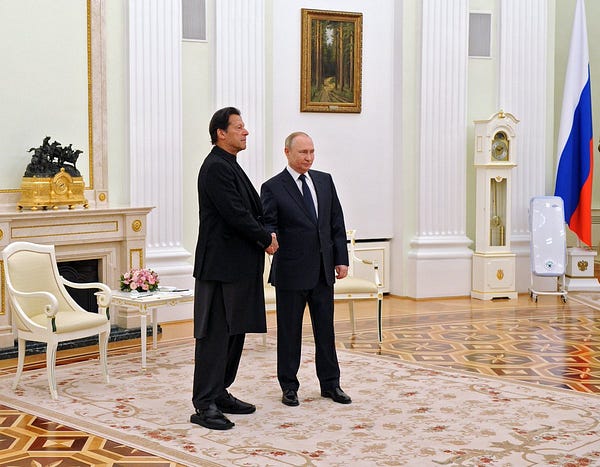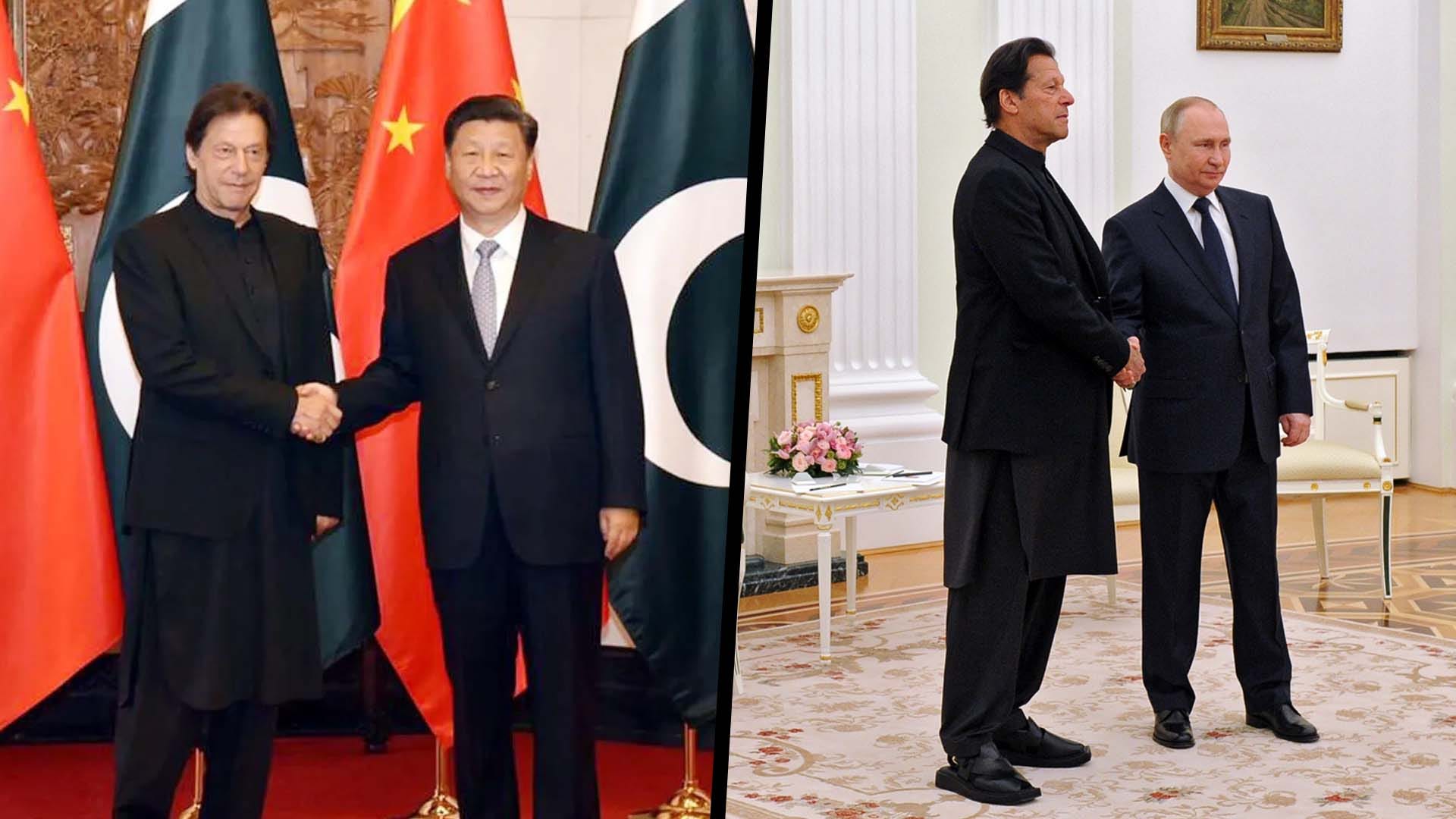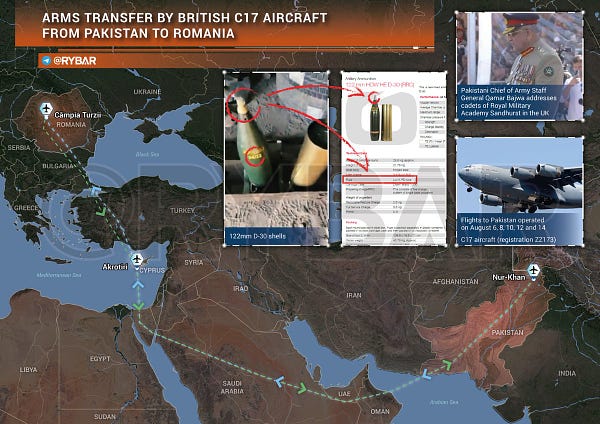Imran Khan: Pakistan should be non-aligned in cold war, neutral over Ukraine, applauds China
Ex Prime Minister Imran Khan argued Pakistan should have been non-aligned in the first cold war and in the new one between the US and China/Russia, as well as independent in the Ukraine proxy conflict
Pakistan's Prime Minister Imran Khan was overthrown in April 2022 in a soft coup supported by the United States. Khan argued that he was targeted due to his independent foreign policy, comparing his ouster to the CIA coup in Iran in 1953.
Since leaving office, Khan has held massive protests across the country, blasting the unelected coup regime for surrendering its sovereignty to Washington.
"The US has made Pakistan a slave without having to invade it," Khan fumed. "The people of Pakistan will never accept the imported government."
Khan has also become a leading voice on the international stage calling for the rebirth of the Non-Aligned Movement.
He argues that Pakistan should have been non-aligned in the first cold war. And he insists his country must be independent today in the new, second cold war between the US on one side and China and Russia on the other.
"Pakistan should not take any sides," Khan said. "Why do we have to take sides? Pakistan should have a good relationship with both China and with the United States. Similarly, I feel with Russia and the United States."
"For instance, that's the policy of India," he added. "I must say that I have always admired the way India remained non-aligned during the [first] cold war. I thought it was a sensible thing to do."

Just weeks before he was overthrown, the US government demanded that Khan denounce Russia over its war in Ukraine. Khan rebuked the pressure campaign, declaring that he refused to be a "slave."
"When we are told to take sides in a conflict like Ukraine, why should we?" Khan asked. "When things that are important to us, the Western countries don't take a stand or moral stand on it. And so I feel that, I think we should be nonaligned in this. We should be neutral."
Khan also praised Beijing's massive poverty reduction program, pointing to the "friend in need" in China as a model for Pakistan, where tens of millions of people struggle in economic hardship.
"There is no precedent in human history of what China has achieved," Khan stressed. "They have lifted 700 million people out of poverty in the last 35, 40 years. It's never been done in human history. And when you go to China, the rate of their development is phenomenal."

Khan issued this call for Pakistan to be be non-aligned in a December 28 interview with the Istanbul, Türkiye-based think tank the Center for Islam and Global Affairs (CIGA).
His proposal marks a radical shift in the foreign-policy history of the South Asian giant, the fifth-most populous country on Earth.
During the first cold war, Pakistan had been a key ally of the United States. It did have good relations with China, but it took a hard line against the Soviet Union.


In the 1980s, Pakistan's notorious spy agency the ISI even helped the CIA and Saudi Arabia support extremist Mujahideen militants in Afghanistan, assisting the US in its proxy war against the USSR.
Khan represents a new generation of Pakistani nationalists who think Islamabad's historic alliance with Washington was a mistake. He wants his country to be independent and to act in the interests of its own people, not those of another nation.
Imran Khan improved relations with Russia weeks before he was overthrown
When Imran Khan arrived to Moscow, he had no idea that he was about to find himself in the middle of a massive global conflict.
The fateful trip had been planned long in advance, and Khan sat down with President Vladimir Putin on February 24, 2022 - the same day that Russia sent its troops into Ukraine.
Clearly, Khan did not know what had been planned. Western governments pressured Khan to denounce Putin, right there on the spot. But he maintained a diplomatic position.


Several days later, 22 Western countries sent Khan a letter demanding that Pakistan vote against Russia on the international stage.
"What do you think of us? Are we your slaves?" Khan shot back defiantly. He asked if they thought "that whatever you say, we will do?"
"We are friends with Russia, and we are also friends with America," Khan explained at the time. "We are friends with China and with Europe; we are not in any camp."
Khan's steadfastness set geopolitical shockwaves across the West. During the first cold war, Pakistan had a very antagonistic relationship with Russia. Now Khan had reversed this longtime policy.
Until he was overthrown in April, Khan made sure that Pakistan was neutral over the Russia-NATO proxy war in Ukraine.
But immediately after the coup, Islamabad's unelected US-backed regime did a 180 and promptly criticized Moscow.
There have even been reports that the coup regime has sent weapons and ammunition to Ukraine.
Imran Khan reiterates that Pakistan should be neutral over proxy war in Ukraine
In his December 28 interview, Khan reiterated his call for Pakistan to be neutral and non-aligned:
I happened to be visiting Moscow on the day when Russia decided to go into Ukraine [February 24, 2022]. You know, I had a meeting that same day with President Putin. So I know the Russian point of view. And the Russian point of view is that we had repeatedly indicated to the Western countries that we would not allow NATO to come right on our doorsteps.
And their argument is that, just like the United States would not want Russia to come in, say, in Mexico, with all their weaponry. So the conflict, from the Russian point of view, has been triggered out of fear that if there are moves in Ukraine, which they felt should have been demilitarized or should have been neutral, they felt that, then the security of Russia was at stake.
And the other thing that President Putin kept saying was that, in the past, Western leaders, American leaders had all told him that, look, this will not happen. And they had given him assurances. And so, unfortunately, he said that these assurances are broken, and hence the conflict.
The Western point of view is very straightforward, that this is Russian aggression; it's invasion; they invaded a country, and they're blaming Russia for all the destruction that is taking place due to war.
So now my point of view, I basically feel that countries like Pakistan, we should not become partisan in this. We should not pass value judgments on this, or moral judgments on this. The reason: I don't feel that our countries should get involved in conflicts that don't affect us. And I'm talking about the developing world, countries like Pakistan, which have 100 million people vulnerable, almost 50 million people below the poverty line, 50 million people above the poverty line.
And so when we make moral judgments in conflicts, it comes at a cost for countries like us. So, for instance, we would have wanted cheap oil from Russia. We would have wanted wheat, 2 million tons of wheat from Russia. A gas pipeline was arranged with a Russian company. So all that gets affected the moment you take sides.
And you know, our neighbor India, which is a part of the Quad, which is a strategic economic-military alliance with the United States, India abstained on this, because they do feel that they needed cheap oil from Russia.
And what this conflict has done, post the Covid situation, where already there was a commodity supercycle, and this conflict has raised energy prices to the level which is causing a lot of problems in Europe. We all know that in Europe they are suffering from gas shortages and an energy prices spike.
But in the developing world, it has caused massive problems in our balance of payments. Because the oil prices going up - I know they're coming down now - but that caused an enormous problem for countries like us.
So therefore, my take on this, there are two points of view, we would like to abstain, my country, we would like to abstain on this. But I do feel that this conflict has caused massive problems all over the world.
Imran Khan criticizes US war on terror: 'We should have stayed neutral'
Khan's push for neutrality also applied to the US government's so-called "war on terror." He stated:
So when came 9/11, Afghanistan gets invaded by the Americans, now the Pakistan government took the stand - which I opposed, we should have stayed neutral - they started supporting the US war on terror.
Imran Khan says Pakistan should maintain good relations with China, Russia, and the US
In the interview, Khan argued that Western countries are hypocritical because they pressure developing countries like Pakistan to take their side, but then the West abandons Pakistan in issues that are important to it.
He explained:
When we are weak countries, we developing countries, are pushed to take sides. And I feel that Pakistan should not take any sides. I'm talking about our country. Because, you know, why? Why do we have to take sides? Pakistan should have a good relationship with both China and with the United States.
Similarly, I feel with Russia and the United States. For instance, that's the policy of India.
I must say that I have always admired the way India remained non-aligned during the [First] Cold War. I thought it was a sensible thing to do.
I mean, when you become part of a bloc, that means that the whole other bloc is excluded from you. And of course, great powers do put enormous pressure on you to take sides.
So let me first say that the China-Pakistan relationship goes back a long time, 60 years. And China has been what we call always a friend in need. China has stood by Pakistan, you know, whether it is on international forums, on politics.
For instance, Kashmir is an issue, a United Nations resolution on Kashmir stating that there should have been a plebiscite in Kashmir, for the people of Kashmir to decide whether they wanted to be with India or Pakistan. And that right was not given to them.
But hardly any other country stands with us. China has always stood with us. And I must say Turkey has stood with us.
But, you know, other even Muslim countries, despite knowing the injustice going on in Kashmir, just like in Palestine, they do not stand with us.
Which is, by the way, one of the reasons I feel that when we are told to take sides in a conflict like Ukraine, why should we? When things that are important to us, the Western countries don't take a stand or moral stand on it.
And so I feel that, I think we should be nonaligned in this. We should be neutral. We should be friendly with both.
Imran Khan praises China's anti-poverty program
Applauding China's anti-poverty program, Khan continued:
What about China? I have seen the development of China in the last 30 years, and I must say what they have achieved is, there is no precedent in human history of what China has achieved. They have lifted 700 million people out of poverty in the last 35, 40 years.
It's never been done in human history. And when you go to China, the rate of their development is phenomenal.
And I just do not think that Western countries will be able to compete with them. Because, you know, electoral politics, it has its limitations. I mean, the amount of maneuvering a democratic government which comes about through electoral politics, you have a lot of limitations.
In China, what is considered national interest? The people stand with the government. And what they have managed to do, like, for instance, shifting populations - I don't think that happened in Western countries.
So I just don't think that the other countries will be able to stop the growth of China. They're a system of meritocracy. I visited China, and I saw the way they bring up all the talent. And then the single focus, long-term planning,
I haven't seen such long-term planning in most countries. Certainly countries like us, which every five years are supposed to have elections. So very rarely governments plan beyond five years. But in China, they have just planned so far ahead. And then they single-handedly pursue their goals. And I feel that, you know, China is going to be the [leader]; I think it will leave everyone behind.
Imran Khan on the allegations of Chinese repression of the Uyghurs: 'There are always two sides of the story'
When asked about Western government allegations that China is guilty of egregious human rights violations against Uyghur Muslims, Khan refused to take the bait, responding diplomatically:
Well, let me say that the Pakistan-China relationship was such that, whatever the issues of Uyghurs, the Chinese have always preferred to speak behind closed doors. Their system is such that they hate talking about sensitive issues like the Uyghurs in public. So we have had discussions with them, and they gave us a different side of the story.
And there are always two sides of the story. And so the conversations I've had with the Chinese government on the Uyghurs, we have always, knowing the sensitivity they feel, we have kept that behind closed doors.
Imran Khan warns nuclear war is not a possibility
Khan also used the December 28 interview as an opportunity to warn that nuclear weapons should never be used, because it would mean "the end of the world."
He said Pakistan's nuclear weapons program is strictly defensive:
First of all, let me tell you, I am not a great fan of nuclear weapons, because I do believe in settling your issues. I'm not also a great fan of military solutions. For instance, I would never try and solve issues militarily.
But for me, it is basically for defense. I mean, if someone is going to take away your freedom, then that's when you fight for it and you use the military.
So the Pakistan military, the nuclear program, has always been a defensive one. Because India is seven times the size of Pakistan. It has huge resources now, and the people in Pakistan have always been threatened by the idea that a bigger neighbor would just overwhelm the country.
Remember that we've had three conflicts with India, and this was from ‘48, 1965, and then 1971.
And so ever since Pakistan has had the nuclear program, we actually have had no conflict. So it gives the country of a 220 million people security, when you are facing a neighbor, which is 1.3 billion people.
And hence, the nuclear program for Pakistan is essentially defensive.
...
The idea of a nuclear war, the idea that you will actually be face to face with another country with nuclear weapons, is beyond my imagination.
And I say this simply because, you know, nuclear war is the end of the world. You must remember, it's a suicide attack on the world, because I don't think the world will be able to sustain or survive a nuclear holocaust.







